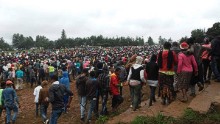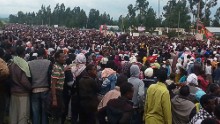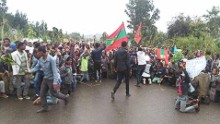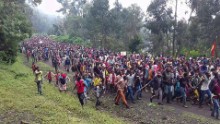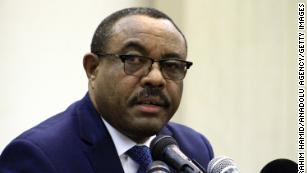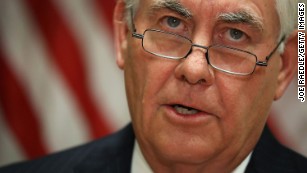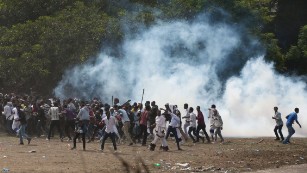A day later, his government declared a nationwide state of emergency, the second such decree in less than two years.
Confronted by relentless and large scale ethnic protests, Hailemariam's government was forced to make highly unusual concessions.
Early in January, the government announced a plan to widen the political space and foster national consensus, including the decision to release political prisoners.
To fulfill that pledge, thus far, the government has released about 8,000 political prisoners, including prominent opposition figures, scholars and journalists jailed over the last two decades.
However, as Hailemariam's abrupt resignation and the subsequent imposition of a martial law highlights, the crisis in the country is explosive and requires an urgent, robust and courageous response by all stakeholders.
US influence
The visit by America's top diplomat, Rex Tillerson, could not have come at a better time. According to the State Department Spokesperson, Tillerson is scheduled to discuss with countries on counter terrorism, peace and security, good governance, and trade and investment, all issues particularly relevant to the crisis in Ethiopia.
Although the United States has long lost its reputation as a shining exponent of human rights and democracy in the region, the United States still wields enormous power over Ethiopia and can leverage its diplomatic power to help steer the country out of the crisis.
Three decades of US policy on Ethiopia has not worked. The ruling Ethiopian People's Revolutionary Democratic Front (EPRDF), which ruled the country with iron-first since it came to power in 1991, is on the verge of unraveling.
The crisis facing the country, a very important geo-strategic partner of the US in the region, requires an urgent, robust and courageous response by all stakeholders.
Tillerson must emphasise to Ethiopian authorities that security and human rights are not two mutually exclusive ideals but rather interdependent and mutually reinforcing. As the United States Embassy in Ethiopia stated recently stated, the response to the crisis can only be 'greater freedom, not less."
Secretary Tillerson must meet with the opposition and the leadership of EPRDF's constituent members, particularly the the Oromo People's Democratic Organization (OPDO) and listen to their concerns.
Political dominance
The ruling Ethiopian People's Revolutionary Democratic Front (EPRDF), which controls seats in parliament and regional assemblies, is on the verge of unraveling, and it is woefully unprepared to meet the challenges facing the country.
The party was created in 1989 by the Tigrayan People's Liberation Front (TPLF), a party that purportedly represents the Tigray ethnic group, about six percent of Ethiopia's estimated
106 million people.
When the downfall of the military dictatorship of Mengistu Hailemariam became imminent, TPLF engineered a coalition to bolster its legitimacy.
Like the EPRDF, the other three members of the coalition - the OPDO, the Amhara National Democratic Movement (ANDM), and the Southern Ethiopian People's Democratic Movement (SEPDM) - were created by TPLF.
Over the last 27 years, TPLF used these forces, with little or no resistance, to rule the country with an iron fist.
Tigrayan domination of the country's political and economic lives are the rallying cries of both the Oromos and Amharas, as competing interests between the coalition parties have plunged the country into the current crisis.
The Oromo and Amhara protests
Three years of relentless protests by the Oromos and Amharas, have irreversibly changed this master-servant relationship.
In Oromia, the epicentre of the Oromo protests, protesters invoked historical marginalization of the Oromo people, emphasizing how their perspectives, experiences, and memories have been pushed to the margin and hidden from the mainstream Ethiopian perspectives.
Their articulation of the issues and their large-scale mobilization forced the OPDO to
reconsider its positions, and eventually challenge TPLF's hitherto unquestioned hegemony.
Emboldened by the waning influence of the TPLF and the political awakening taking root in Oromia, the largest and wealthiest of Ethiopia's nine linguistic-based states, the OPDO is now upping the ante by demanding the chairmanship of the EPRDF and the office of the Prime Minister.
Ethiopia's next leader
EPRDF is expected to name a new party leader when its 180-member Council convenes this week in a high stakes meeting. The decision, the most important and contentious vote in its nearly three decades of authoritarian rule, will be consequential both for the party and the country.
If its candidate is not elected, OPDO will face fresh questions from the Oromo public.
Oromos makeup more than almost 40 percent of Ethiopia's population but they have not had a political power commensurate with its size and immense contribution to the country's economy.
There is already a strong sense within the Oromo community that the Ethiopian state and its institutions are hostile to the Oromo, a notion best captured in a 1978 essay titled
"Ethiopia's Unacknowledged Problem -- The Oromo."
Ignoring OPDO's quest to take the mantle of leadership requires an enormous amount of effort on the part of coalition partners not to recognize the particular nature of the crisis and what it takes to fix it.
Transformative change
Regardless of who may succeed Hailemariam, Ethiopia's next leader faces the challenging task of reforming and democratizing the EPRDF.
The leader must also unite a deeply divided country behind a democratic and all-inclusive agenda.
It would also mean repealing a slew of repressive legislation, including the anti-terrorism proclamation and the charities and societies law; reviving the press and civil society; reforming the electoral board and the security sector.
Despite widespread fears of uncontrollable violence, the crisis can also be an opportunity that can offer some promise of a hopeful transition. EPRDF has a trust deficit, but most Ethiopians are cautiously optimistic.
If reformists within the EPRDF prevail in the ongoing power struggle and act with the utmost caution, putting country before an individual or party interest, Ethiopia has a real chance for a transformative change, and the US and all other stakeholders must do all they can to enable them.

